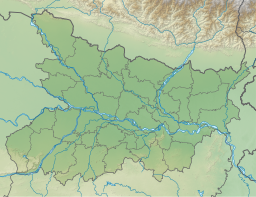This article has multiple issues. Please help improve it or discuss these issues on the talk page. (Learn how and when to remove these template messages)
|
Harahi Lake (Hindi/Devanagari: हराही पोखर) is located near Darbhanga Railway Station, Darbhanga District, Bihar, India. There are two other lakes, Ganga Sagar Lake and Dighi Lake,[1] which are situated in a line, with a drive passing from one to the other, and their united length is 6,000 feet. The Ganges Sagar Lake is the largest lake among these three.[2] Its most distinguishing feature is the many large tanks, which give it a beautiful appearance during the rains. Harahi being 1,600 feet in length and 1,000 feet in width; Dighi 2,400 feet in length and 1,200 feet in width; the Ganga Sagar 2,000 feet length and 1,000 feet width.[3]
| Harahi Lake | |
|---|---|
 Harahi Lake also known as Bone Lake at the time of Raj Darbhanga. | |
| Location | Kathalbari, Darbhanga, Bihar, India |
| Coordinates | 26°09′21″N 85°54′19″E / 26.155944°N 85.905210°E |
| Basin countries | India |
| Max. length | 487.68 metres (1,600.0 ft) |
| Max. width | 304.8 metres (1,000 ft) |
| Settlements | Darbhanga |
History
editIt has been conjectured that these were excavated in order to secure raised ground for soldiers' quarters, this theory resting on the belief that the town was once a Musalman cantonment.[3]
Legend
editThe local tradition, however, is that in the time of Raja Siva Singh,[4] a fisherwoman, with a basket of fish on her head, was on her way to market, accompanied by her daughter-in-law. A Kite (bird) from a neighboring tree pounced down and carried away a fish from the basket. Instead of sympathizing with her, the daughter-in-law began to laugh. Enraged at her unfilial conduct, the mother-in-law gave vent to her anger, and a hot quarrel ensued. All this was witnessed by the Raja as he sat at his window, and he lost no time in sending for the women. He asked the younger woman the cause of her unseasonable laughter; but she begged hard to be excused, saying that if she told her story it would be certain death to her. The Raja's curiosity being roused, he insisted on hearing her reason. "In the reign of the king Yudhishthira," said the younger fisherwoman, "I was a kite (bird). During the war of the Mahabharata, I carried away the arm of a woman, with a golden bracelet weighing 80 maunds (1 maund = 37.3242 Kg), and brought it here and ate it. I laughed at the thought of the petty greed of the puny kites of the present time, who do not mind pouncing down on a paltry fish." Saying this, she expired.[3]
The Maharaja, curious to find out the truth of the story, ordered a series of tanks to be dug in the places pointed out. At last, his perseverance was rewarded by finding the skeleton of the arm, as well as the golden bracelet; and so the tank in which they were found was called Harahi or the Bone tank.[5]
References
edit- ^ Newswrap (12 November 2019). "हराही पोखर पर 12 को चलेगा अभियान" (in Hindi). Live Hindustan. Retrieved 11 May 2021.
- ^ "अपने मूल स्वरूप को खो रहा एतिहासिक गंगासागर तालाब" (in Hindi). Dainik Jagran. 29 October 2018. Retrieved 11 May 2021.
- ^ a b c O'malley, L. S. S. (1907). Bengal District Gazetteers: Darbhanga (PDF). The Bengal Secretariat Book Depot. p. 147. Retrieved 11 May 2021.
- ^ "King Shiv Singh – A Fearless Warrior Who Sacrificed Himself For Mithila's Freedom". Mithila Connect. Team MithilaConnect. 31 March 2016. Archived from the original on 11 September 2022. Retrieved 11 May 2021.
- ^ O'malley, L. S. S. (1907). Bengal District Gazetteers: Darbhanga (PDF). The Bengal Secretariat Book Depot. p. 148. Retrieved 11 May 2021.

